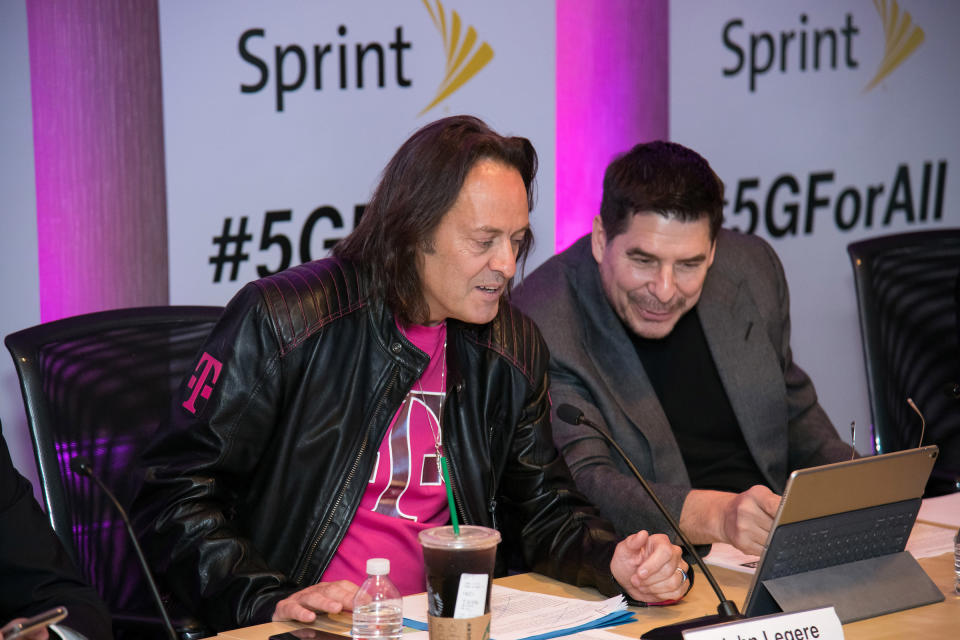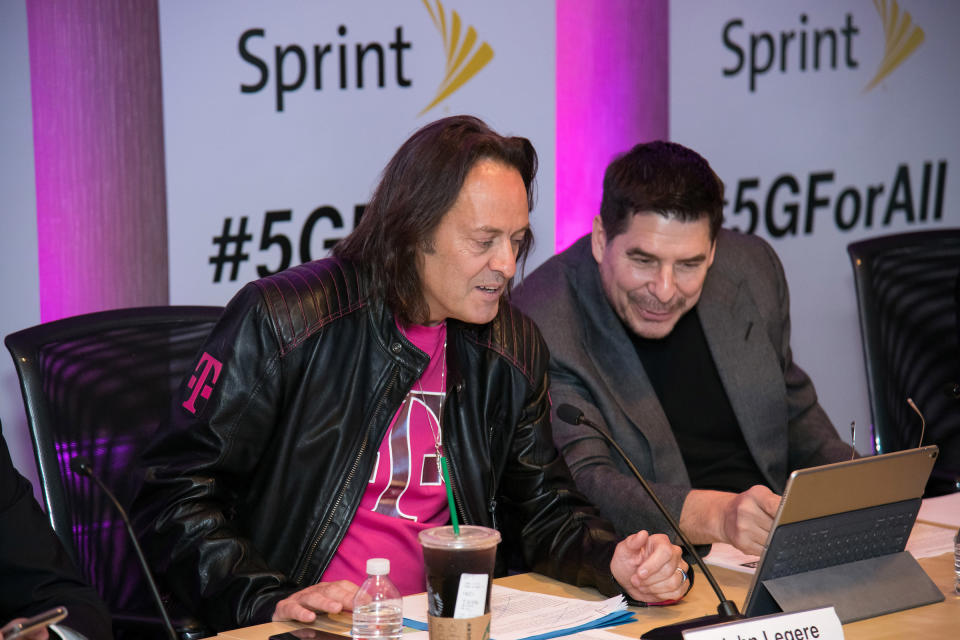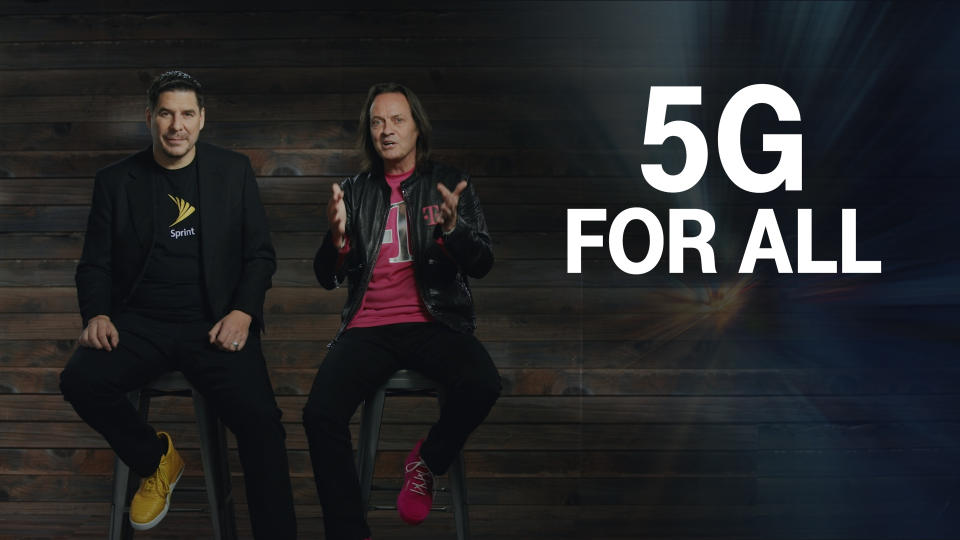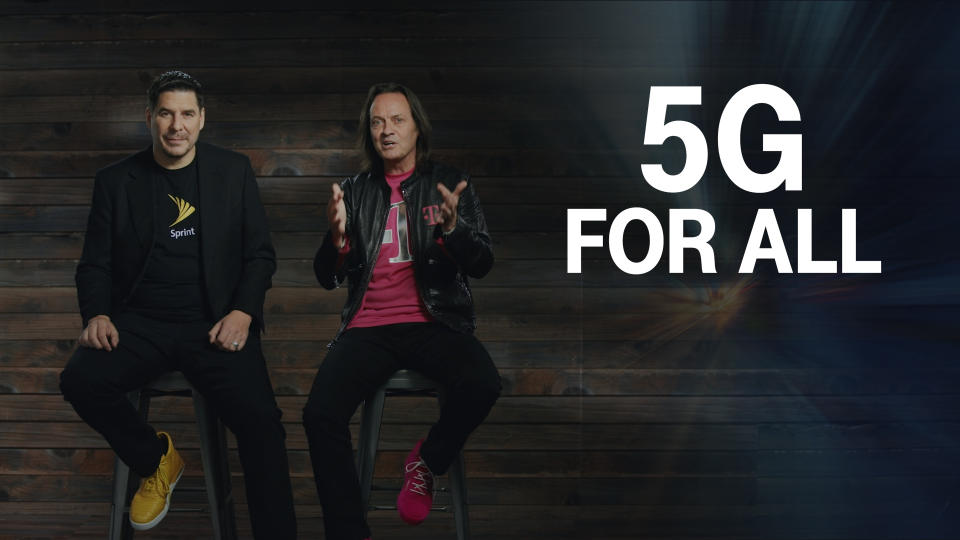Sprint and T-Mobile: A coalition of also-rans
The tale of a union that's been years in the making.
Once upon a time, two wireless carriers were struggling to survive in a cutthroat business. They tried going it alone, and even almost married other players. But each seemed to find a kindred spirit in the other, and they soon began a courtship. After months of rumors, false starts and premature breakups, T-Mobile and Sprint are finally getting together. Well, pending regulatory approval, anyway. Their respective parent companies Deutsche Telekom and Softbank have reached an agreement to merge the two US carriers, and they're calling the resulting company the "New T-Mobile." No cute couple name here (sad; I'd fully ship Spree-Mobile or Trint), but the combined organization would be worth a total of $146 billion and cover almost 100 million subscribers.
The ramifications of this union are significant. Not only would this cut the number of US national carriers from four to three, but it could also spur serious change in the wireless industry, and it all boils down to one crucial reason: better competition. That sounds a little counter-intuitive, since cutting the number of national carriers seems on the surface like it's reducing competition.
Why is competition such a big deal?
In the announcement, the companies take pains to spell out how the merger will "create more competition." It isn't just an effort to reassure subscribers, but also to persuade regulators (in this case the FCC and the Department of Justice) to approve the union. Competition is a key point of consideration here, and history bears this out.
Back in 2011, when AT&T tried to take over T-Mobile, the DOJ's antitrust division sued the companies involved to block that merger. The concern then was that the resulting carrier would become the largest wireless provider in the US, potentially driving up prices and limiting the options available to consumers. Ultimately, the FCC's concerns over creating a monopoly were so overwhelming that AT&T withdrew its bid.
Capitalism relies on competition and consumer choice to drive down costs and spur innovation. A monopoly or oligopoly would give the sole (or few) service provider(s) full control over pricing, features and quality of service. Without healthy competition, the entire economic system that the US relies on falls apart.
Why did they do it?
By combining their powers, the "New T-Mobile" is much better positioned to take on rivals AT&T and Verizon. In a video announcing the agreement, T-Mobile CEO John Legere said the new company will "create robust competition and lower prices across wireless, video and broadband."
According to a news release, "The combined company will have lower costs, greater economies of scale and the resources to provide US consumers and businesses with lower prices." The argument is that having fewer competitors on more equal footing is better than more options, where there are clear winners and losers.
The money the new T-Mobile would save from not having to compete against each other, and pooling their resources instead of building out separate infrastructures, could indeed allow for higher profits while charging low fees. That would enable the new company to continue Sprint and T-Mobile's strategy of undercutting AT&T and Verizon in pricing.
Legere also believes that "this isn't a case of going from four to three wireless companies." He said in a statement, "There are now at least seven or eight big competitors in this converging market. And in 5G, we'll go from zero to one. Only the New T-Mobile will have the capacity to deliver real, nationwide 5G."
That's obvious (and typical) hyperbole from Legere -- there will be more than one 5G carrier, and it's still too early to say if any single company will emerge victorious. Plus there aren't seven or eight "big competitors" -- the players with enough clout to be serious competition truly are just AT&T and Verizon.
Why the focus on 5G?

Much of the announcement focused on how the union could boost the new T-Mobile's position in the race to deliver a widely available 5G network. The first 5G-ready phones are expected to be available in 2019, which would put pressure on carriers that risk losing disgruntled customers to rivals that beat them to the punch.
The company was upfront about why the merger was necessary if either individual partner was to even have a hope in taking on AT&T, Verizon and international rivals. "Neither company standing alone can create a nationwide 5G network with the breadth and depth required to fuel the next wave of mobile Internet innovation in the U.S. and answer competitive challenges from abroad," T-Mobile said.
5G offers something of a fresh start for the carriers. T-Mobile and Sprint, which struggled mightily in the 4G rollout (hey, WiMax!), will have an opportunity to reinvent themselves in a less established arena. Though AT&T and Verizon own most of the recently freed up spectrum that will power the new standard, the combined Sprint and T-Mobile airwaves put them in a better position to build out coverage. Plus, the merged entity can spend more on infrastructure. By pooling their resources, Sprint and T-Mobile should be able to get off to a faster start in the 5G race.
That's not to say the union will fix all their problems or give them a lead. It would take years to technologically integrate the two networks, and T-Mobile has said the merger would take three years to complete. In that time, AT&T and Verizon will continue to plow ahead on 5G, and they don't have to deal with the messy minutiae of a merger on the side, either.
Wrap-up
As with all budding relationships, there's no way to predict how this attempted union will pan out. The regulators could shut it down, the presumed benefits for the new T-Mobile's 5G endeavors could end up costing more than predicted, and even if it passes scrutiny, it'd take years to close the deal. All we can do now is speculate. Cutting back on the number of competitors doesn't sound like it would work in the consumer's favor, but it doesn't have to be a bad thing. If T-Mobile continues its Uncarrier moves backed by Sprint's loving support, the scrappy pair could perhaps even take on the top dogs in a modern Cinderella story.




